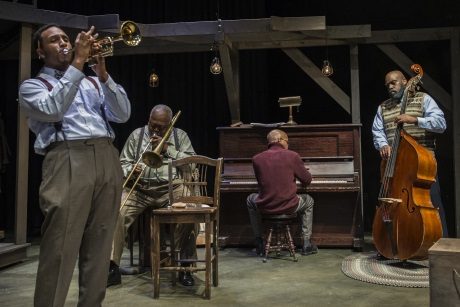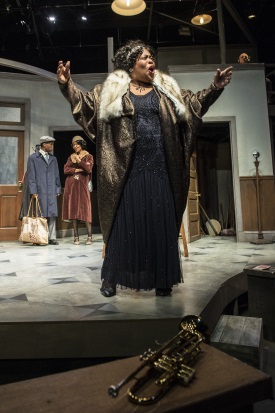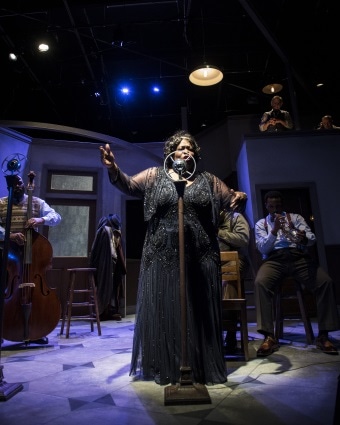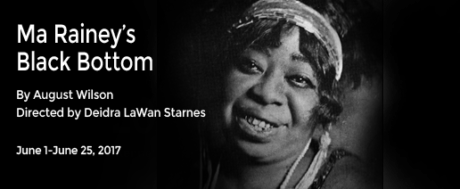The late self-taught playwright and poet August Wilson’s ten-play Century Cycle has enjoyed a renaissance in recent years, with movie star Denzel Washington committing to bringing that cycle to the screen. Wilson’s work is some of the best ever written in American theater and it is fitting that 1st Stage chose to produce the third play in Wilson’s Century Cycle, Ma Rainey’s Black Bottom, which won a 1985 Tony Award for Best Play. With loving direction by Deidra Lawan Starnes and an insanely talented cast, Ma Rainey’s Black Bottom is stage magic, pure theatrical gold.

The play takes place in Chicago, in the winter of 1927. Calvin Coolidge was President. The economy was booming. Hollywood had recently introduced “talkies”—movies with sound. You could buy a bottle of coke for a nickel and a fine pair of shoes for 11 dollars. A dance craze named the Black Bottom was sweeping the country.
On to this setting, stepped singer Gertrude “Ma” Rainey (1886-1939), played by Thomascena (Tomi) Nelson, and her band members Cutler (William T. Newman, Jr., who is an Arlington Circuit Court Chief Judge), Toledo (Michael Anthony Williams), Slow Drag (Jason B. McIntosh) and Levee (Clayton Pelham, Jr., a Helen Hayes Award Recipient). The band was in the studio of record company owner Mel Sturdyvant (William Aitken) to record Rainey’s songs, including the titular “Ma Rainey’s Black Bottom.”
The part of the story that burned the brightest was the interaction between Rainey’s bandmates in the record company’s rehearsal space. These four divergent personalities debated, told stories and philosophized as they waited for Rainey’s arrival. There was set-in-his-ways trombonist Cutler, laconic bass man Slow Drag, Afrocentric-thinking and “woke” piano player Toledo and audacious trumpet player Levee, who yearned to form his own band and who had serious creative differences with Rainey over musical arrangements.
Pelham totally embodied the outspoken, frenetic Levee, imparting the soul of that character to the audience. Levee’s vision was of a new and improved form of both blues music and how to make money while dealing with the dominant society. Pelham played those objectives in such a way that all of Levee’s emotions were on display: joy, pain and hot rage. His angry-at-the-Almighty monologue was phenomenal.

Williams’ interpretation of Toledo was every bit as powerful as Pelham’s Levee, and indeed it had to be. The bookish piano player Toledo sparred and lectured Levee throughout the play about the essence of being of African descent and living in America. The two actors’ performances built a tension that melded into a collective and unforgettable chemistry.
Newman’s Cutler, was every bit the older, wiser observer of the goings on in that rehearsal space, often serving as a reasonable voice—a contrast to Toledo and Levee’s arguing. Newman excelled in playing Cutler’s silent, observing moments in which his facial expressions told what he was thinking on the inside.
McIntosh’s Slow Drag showed good camaraderie with Cutler. McIntosh excelled in his scenes talking about the various juke joints he and Cutler played in, and the trouble they survived.
Nelson’s “Ma” Rainey was bold and commandeering. Rainey, as artists of any color, then and now, had to navigate the business side of show business. Rainey was a woman who understood that she had a talent to sell and to ensure she got paid for that talent. The real life Rainey was unceremoniously let go by Paramount Records in the late 20s when her style of blues went out of fashion, but she rebounded and ran two theaters in her hometown during retirement. Nelson displayed earthy vocals in the rendition of the titular song.
The cast was spectacular throughout. Veteran DC-area broadcaster Joe Palka was every bit the put-upon, chronically exasperated manager Irvin, who constantly ran interference between Rainey and Aitken’s Sturdyvant. Aitken brought a hardy jerkiness to the role that made his character hateable. Tracey Farrar brought sultriness and an understated cunning to her role as Rainey’s girlfriend-with-a-wandering-eye, Dussie Mae. Tendo Nsubuga brought Rainey’s stuttering nephew, who Rainey insisted be included in the recording, to a vivid reality. Joshua Witt, recently seen in Richard III, had a strong scene as a policeman.
Gorgeous fails to fully give credit to Kathryn Kawecki’s set, which depicted mainly a recording studio and rehearsal space. I liked the use of stained-wood doors, translucent glass, and the tiled floor. Deb Crerie’s excellent props included two upright pianos, a trombone, trumpet, guitar, a faux copy of the Chicago Defender newspaper, and two stunningly beautiful old-school microphones. From the men’s suspenders and suits to the women’s 20’s era dresses, Debra Kim Sivigny’s costume design was outstanding.

This is the best show I’ve seen this year. Starnes’ directorial debut at 1st Stage brought forth not just sterling performances, but glimpses of real people. The performers received a stirring standing ovation, a perfectly appropriate response to the superior display of artistic eloquence that had been displayed on stage. Ma Rainey’s Black Bottom is the pinnacle of plays produced in the D.C. area this year. Buy a ticket and see theater the best it can be done.
Running Time: Two hours and 45 minutes, with a 30-minute intermission.
Ma Rainey’s Black Bottom plays through June 25, 2017, at 1st Stage – 1524 Spring Hill Road, in Tysons, VA. For tickets, call the box office at (703) 854-1856, or purchase them online.





